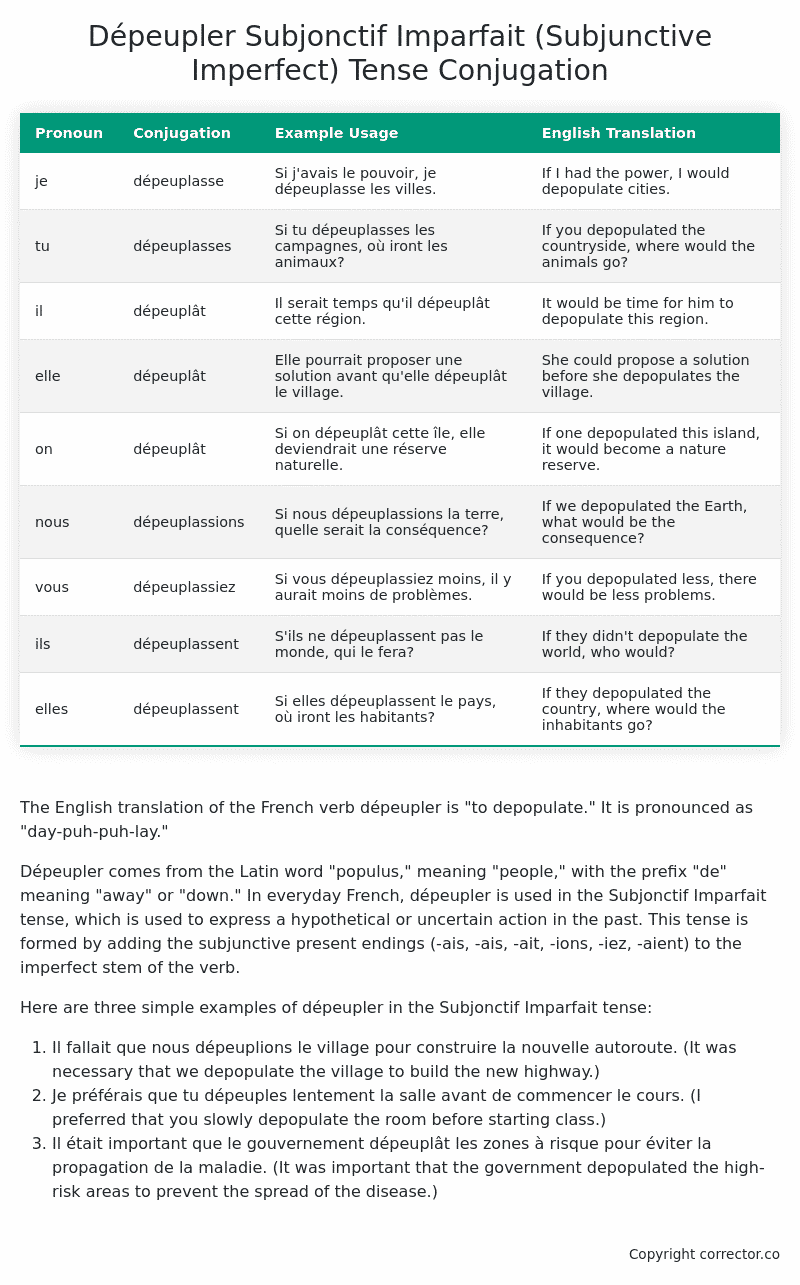Subjonctif Imparfait (Subjunctive Imperfect) Tense Conjugation of the French Verb dépeupler
Introduction to the verb dépeupler
The English translation of the French verb dépeupler is “to depopulate.” It is pronounced as “day-puh-puh-lay.”
Dépeupler comes from the Latin word “populus,” meaning “people,” with the prefix “de” meaning “away” or “down.” In everyday French, dépeupler is used in the Subjonctif Imparfait tense, which is used to express a hypothetical or uncertain action in the past. This tense is formed by adding the subjunctive present endings (-ais, -ais, -ait, -ions, -iez, -aient) to the imperfect stem of the verb.
Here are three simple examples of dépeupler in the Subjonctif Imparfait tense:
- Il fallait que nous dépeuplions le village pour construire la nouvelle autoroute. (It was necessary that we depopulate the village to build the new highway.)
- Je préférais que tu dépeuples lentement la salle avant de commencer le cours. (I preferred that you slowly depopulate the room before starting class.)
- Il était important que le gouvernement dépeuplât les zones à risque pour éviter la propagation de la maladie. (It was important that the government depopulated the high-risk areas to prevent the spread of the disease.)
Table of the Subjonctif Imparfait (Subjunctive Imperfect) Tense Conjugation of dépeupler
| Pronoun | Conjugation | Example Usage | English Translation |
|---|---|---|---|
| je | dépeuplasse | Si j’avais le pouvoir, je dépeuplasse les villes. | If I had the power, I would depopulate cities. |
| tu | dépeuplasses | Si tu dépeuplasses les campagnes, où iront les animaux? | If you depopulated the countryside, where would the animals go? |
| il | dépeuplât | Il serait temps qu’il dépeuplât cette région. | It would be time for him to depopulate this region. |
| elle | dépeuplât | Elle pourrait proposer une solution avant qu’elle dépeuplât le village. | She could propose a solution before she depopulates the village. |
| on | dépeuplât | Si on dépeuplât cette île, elle deviendrait une réserve naturelle. | If one depopulated this island, it would become a nature reserve. |
| nous | dépeuplassions | Si nous dépeuplassions la terre, quelle serait la conséquence? | If we depopulated the Earth, what would be the consequence? |
| vous | dépeuplassiez | Si vous dépeuplassiez moins, il y aurait moins de problèmes. | If you depopulated less, there would be less problems. |
| ils | dépeuplassent | S’ils ne dépeuplassent pas le monde, qui le fera? | If they didn’t depopulate the world, who would? |
| elles | dépeuplassent | Si elles dépeuplassent le pays, où iront les habitants? | If they depopulated the country, where would the inhabitants go? |
Other Conjugations for Dépeupler.
Le Present (Present Tense) Conjugation of the French Verb dépeupler
Imparfait (Imperfect) Tense Conjugation of the French Verb dépeupler
Passé Simple (Simple Past) Tense Conjugation of the French Verb dépeupler
Passé Composé (Present Perfect) Tense Conjugation of the French Verb dépeupler
Futur Simple (Simple Future) Tense Conjugation of the French Verb dépeupler
Futur Proche (Near Future) Tense Conjugation of the French Verb dépeupler
Plus-que-parfait (Pluperfect) Tense Conjugation of the French Verb dépeupler
Passé Antérieur (Past Anterior) Tense Conjugation of the French Verb dépeupler
Futur Antérieur (Future Anterior) Tense Conjugation of the French Verb dépeupler
Subjonctif Présent (Subjunctive Present) Tense Conjugation of the French Verb dépeupler
Subjonctif Passé (Subjunctive Past) Tense Conjugation of the French Verb dépeupler
Subjonctif Imparfait (Subjunctive Imperfect) Tense Conjugation of the French Verb dépeupler (this article)
Subjonctif Plus-que-parfait (Subjunctive Pluperfect) Tense Conjugation of the French Verb dépeupler
Conditionnel Présent (Conditional Present) Tense Conjugation of the French Verb dépeupler
Conditionnel Passé (Conditional Past) Tense Conjugation of the French Verb dépeupler
L’impératif Présent (Imperative Present) Tense Conjugation of the French Verb dépeupler
L’infinitif Présent (Infinitive Present) Tense Conjugation of the French Verb dépeupler
Struggling with French verbs or the language in general? Why not use our free French Grammar Checker – no registration required!
Get a FREE Download Study Sheet of this Conjugation 🔥
Simply right click the image below, click “save image” and get your free reference for the dépeupler Subjonctif Imparfait tense conjugation!

Dépeupler – About the French Subjonctif Imparfait (Subjunctive Imperfect) Tense
Formation
Common Everyday Usage Patterns
Interactions with Other Tenses
Subjonctif Présent
Indicatif Passé Composé
Conditional
Conditional Perfect
Summary
I hope you enjoyed this article on the verb dépeupler. Still in a learning mood? Check out another TOTALLY random French verb conjugation!


